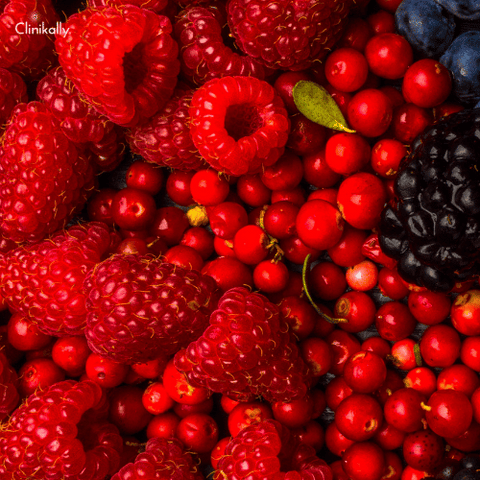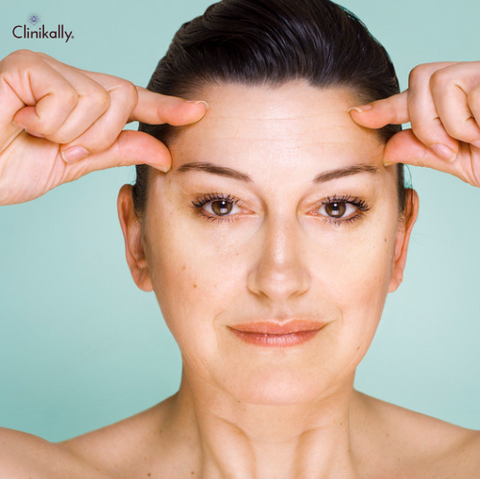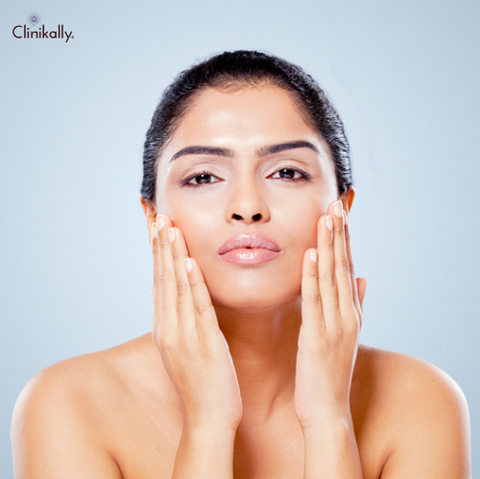Resveratrol is an antioxidant that can be found in red grapes, peanuts, and some berries. Its potential anti-aging benefits have helped it become more well-liked in the skincare sector in recent years. According to studies, resveratrol can aid in defending the skin against environmental stresses like pollution and UV rays. This is achieved by scavenging free radicals, which can result in oxidative stress and early ageing. It has also been demonstrated that resveratrol increases the production of collagen, which is essential for maintaining skin elasticity and preventing wrinkles. Additionally, it can aid in reducing inflammation, which can worsen other skin problems like ageing skin. Resveratrol may even lengthen skin cells' lives, making them stronger and healthier, according to one study.
Many skincare products, including serums, moisturisers, and masks, contain resveratrol. Anyone looking to improve the overall health and appearance of their skin can use it, but those with mature or sun-damaged skin may benefit the most from it. It's worth noting that while resveratrol has shown promising benefits for the skin, more research is needed to fully understand its effects and how it can be best used in skincare. As with any skincare ingredient, it's important to patch test and introduce it slowly into your routine to ensure it works well with your skin.
Understanding Resveratrol and Its Origins

Resveratrol is a polyphenolic compound found in a variety of plants, including grapes, peanuts, berries, and Japanese knotweed. These plants produce it as a defence mechanism against pathogens and other stresses. Red wine, which is made from grapes, has the highest concentration of resveratrol. As red wine has been linked to a lower risk of certain diseases, this has sparked a lot of interest in the potential health benefits of resveratrol. The health benefits of resveratrol are thought to include anti-inflammatory and antioxidant effects that may help to reduce the risk of cardiovascular disease and other chronic illnesses. Additionally, it has been demonstrated in lab studies to possibly have anti-cancer effects, though additional studies are required to substantiate these results.
What is Resveratrol?
Resveratrol is a natural compound that belongs to the stilbene class of polyphenolic compounds. It can be found in a variety of plants, including grapes, berries, peanuts, and Japanese knotweed. Because of its potential health benefits, resveratrol has gained popularity in recent years. According to research, resveratrol may have antioxidant and anti-inflammatory properties that can help protect the body from free radicals and other harmful molecules. It may also aid in the improvement of insulin sensitivity, the reduction of inflammation, and the reduction of the risk of cardiovascular disease. There has been some evidence that resveratrol may have anti-cancer properties, but more studies are required to confirm this. Researchers looking into anti-aging have also become interested in resveratrol because it may help activate specific genes linked to promoting longevity.
Natural Sources of Resveratrol
The following list of naturally occurring sources contains resveratrol:
-
Grapes: The skin of grapes, especially red grapes, is highly concentrated in resveratrol. This is why red wine is frequently mentioned as a good source of resveratrol.
-
Berries: Blueberries, cranberries, and raspberries are just a few of the berries that contain resveratrol.
-
Peanuts: Although technically a legume, peanuts contain resveratrol in their skin.
-
Japanese knotweed: This plant, which has high levels of resveratrol, is frequently used to make supplements that contain the chemical.
-
Cocoa: Resveratrol can be found in cocoa powder and dark chocolate.
-
Other fruits and vegetables: Other fruits and vegetables, such as apples, pomegranates, and tomatoes, contain smaller amounts of resveratrol.
How Resveratrol Works
Resveratrol is a polyphenol with a variety of biological effects on the body. The following are some of the ways that resveratrol functions:
-
Antioxidant properties: Resveratrol is a potent antioxidant that can help protect cells from damage caused by free radicals. It works by neutralising these harmful molecules, which can help reduce oxidative stress in the body.
-
Anti-inflammatory properties: Resveratrol has anti-inflammatory properties, which can help reduce inflammation throughout the body. Chronic inflammation has been linked to a variety of health issues, including heart disease, diabetes, and certain cancers.
-
Hormone regulation: Resveratrol has been shown to influence the activity of several hormones in the body, including oestrogen, testosterone, and insulin. This can help improve hormone balance and lower the risk of hormone-related diseases like breast cancer and diabetes.
-
Cellular metabolism: Resveratrol has been shown to improve cellular metabolism by activating certain energy-producing enzymes. This can help improve overall metabolic health and may contribute to some of resveratrol's anti-aging effects.
-
Gene expression: Resveratrol has been shown to influence gene expression in ways that promote longevity and lower the risk of age-related diseases. Some of the genes activated by resveratrol have been linked to cellular repair, stress response, and DNA stability.
The Anti-Aging and Antioxidant Benefits of Resveratrol

Resveratrol has been the subject of extensive research into its anti-aging and antioxidant properties. Resveratrol may help slow the ageing process and provide antioxidant benefits in the following ways:
-
Fighting free radicals: Resveratrol, an effective antioxidant, can assist in the neutralisation of free radicals, unstable molecules that can lead to oxidative stress and cell damage. Resveratrol may help slow down ageing and lower the risk of age-related diseases by reducing oxidative stress.
-
Supporting cellular health: Resveratrol has been shown to promote cellular health by activating genes and enzymes involved in cellular repair and stress response. Resveratrol may help protect against DNA damage and slow the ageing process by promoting cellular health.
-
Improving cardiovascular health: Resveratrol may benefit cardiovascular health by lowering inflammation, blood pressure, and cholesterol levels. Resveratrol may help reduce the risk of age-related cardiovascular diseases by supporting heart health.
-
Boosting brain function: Resveratrol has been shown to improve brain function and lower the risk of age-related cognitive decline. It has been shown to increase blood flow to the brain, protect against oxidative stress, and stimulate neural growth.
-
Activating longevity genes: Resveratrol has been shown to activate genes involved in promoting longevity and lowering the risk of age-related diseases. Sirtuins, which are involved in cellular repair and stress response, are among these genes.
Neutralising Free Radicals
One of the primary ways that resveratrol provides antioxidant benefits is by neutralising free radicals. Free radicals are unstable molecules that, by stealing electrons from other molecules in the body, can cause oxidative stress and cell damage. This damage can contribute to the development of diseases such as cancer, heart disease, and Alzheimer's. Resveratrol is a powerful antioxidant that can neutralise free radicals by donating an electron to stabilise them, thereby breaking the oxidative damage cycle. This protects cells and tissues from free radical damage and lowers the risk of age-related diseases.
The ability of resveratrol to neutralise free radicals is due to its chemical structure, which allows it to scavenge and stabilise free radicals. It can neutralise a variety of free radicals, including superoxide, hydroxyl, and peroxyl radicals. Additionally, resveratrol can boost the activity of antioxidant enzymes like glutathione peroxidase and superoxide dismutase (SOD), which defend cells from oxidative damage.
Boosting Collagen and Elasticity
Resveratrol has been shown to increase skin collagen and elasticity, which can help reduce the signs of ageing. Here are some of the ways resveratrol may benefit skin health:
-
Stimulating collagen production: Resveratrol has been shown to increase collagen production in the skin by activating specific genes and enzymes involved in collagen synthesis. This can help to firm up the skin and reduce the appearance of wrinkles and fine lines.
-
Reducing collagen degradation: Resveratrol can also help reduce collagen breakdown in the skin by inhibiting collagen-degrading enzymes such as matrix metalloproteinases (MMPs). Resveratrol may help maintain skin firmness and elasticity by protecting collagen from degradation.
-
Improving skin hydration: Resveratrol improves skin hydration by strengthening the skin's barrier function and preventing water loss. This can help to moisturise the skin and reduce the appearance of fine lines and wrinkles.
-
Protecting against UV damage: Resveratrol has been shown to protect the skin from UV-induced damage, which can contribute to collagen and elastin breakdown. Resveratrol may help maintain skin firmness and elasticity by reducing UV damage.
Protecting Skin from UV Damage
UV rays from the sun can cause skin damage such as premature ageing, wrinkles, and an increased risk of skin cancer. Resveratrol has been shown to protect the skin from UV-induced damage in a variety of ways, including:
-
Acting as a sunscreen: Resveratrol has been found to possess some UV-absorbing qualities, which means it may be able to assist in preventing some UV radiation from reaching the skin. Resveratrol may offer some additional UV protection when used in conjunction with a broad-spectrum sunscreen, though it is not a replacement for sunscreen.
-
Reducing oxidative stress: Oxidative stress in the skin can result from UV radiation and cause DNA damage, inflammation, and the deterioration of collagen and elastin. Resveratrol is an effective antioxidant that can help fight off free radicals and lessen oxidative stress, which can shield the skin from UV ray damage.
-
Enhancing DNA repair: Resveratrol has been demonstrated to enhance DNA repair processes in the skin, which may help lower the risk of mutations and skin cancer brought on by UV radiation.
-
Reducing inflammation: Resveratrol has anti-inflammatory qualities that may help lessen inflammation brought on by UV radiation, which may contribute to skin ageing and damage.
Reducing Inflammation
Resveratrol has been shown to have anti-inflammatory properties in the body, which may help reduce the risk of chronic inflammation and related diseases. Here are some of the ways resveratrol may aid in inflammation reduction:
-
Inhibiting inflammatory pathways: Several pro-inflammatory pathways in the body, including the NF-kappaB and COX-2 pathways, are inhibited by resveratrol. Resveratrol can help reduce the production of inflammatory cytokines and other mediators of inflammation by inhibiting these pathways.
-
Reducing oxidative stress: Resveratrol is a powerful antioxidant that can aid in the neutralisation of free radicals and the reduction of oxidative stress, both of which can contribute to chronic inflammation.
-
Modulating the immune system: Resveratrol has been shown to modulate the activity of immune cells that play a role in inflammation, such as T cells and macrophages. Resveratrol can help reduce inflammation in the body by regulating immune cell activity.
-
Supporting gut health: Resveratrol has been shown to promote the growth of beneficial gut bacteria, which may aid in the reduction of inflammation in the gut and throughout the body.
Incorporating Resveratrol into Your Skincare Regimen

Resveratrol is a potent antioxidant that has been shown to help the skin by reducing the signs of ageing, protecting against UV damage, and reducing inflammation. Here are some suggestions for incorporating resveratrol into your skincare routine:
-
Look for resveratrol-containing skincare products: There are several skincare products available that contain resveratrol, such as serums, creams, and masks. Look for products that contain a high concentration of resveratrol for maximum benefits.
-
Use a resveratrol-infused toner: You can use a toner that contains resveratrol to help hydrate and protect your skin. Apply the toner to your face after cleansing to help remove any remaining dirt or impurities and to prepare your skin for the next steps in your skincare routine.
-
Apply a resveratrol serum: A resveratrol serum can help reduce the appearance of fine lines and wrinkles, improve skin firmness, and protect against UV damage. Apply a few drops of the serum to your face after toning and before moisturising.
-
Use a resveratrol-infused moisturiser: A moisturiser that contains resveratrol can help hydrate and protect your skin throughout the day. Apply the moisturiser to your face after applying your serum.
-
Consider taking resveratrol supplements: While the research is limited, taking resveratrol supplements may provide some benefits for the skin. Talk to your healthcare provider before taking any supplements to make sure they are safe for you.
Choosing the Right Resveratrol Products
To make sure you are getting a high-quality and efficient product, there are a few things to take into account when choosing resveratrol products:
-
The concentration of resveratrol: Look for products with a high concentration of resveratrol to provide the most benefits to your skin. Check the label to see how much resveratrol is in the product.
-
Form of resveratrol: Resveratrol is available in a variety of forms, including trans-resveratrol and cis-resveratrol. The more active and stable form, trans-resveratrol, is frequently used in skincare products.
-
Additional ingredients: Look for products that include other beneficial ingredients like antioxidants, vitamins, and peptides, as these can help resveratrol's benefits.
-
Brand reputation: Select a reputable brand with a track record of producing high-quality skincare products. Look for brands with positive customer feedback that use natural and organic ingredients.
-
Price: While price is not always an indicator of quality, be wary of products that seem too inexpensive or too expensive. Look for products that are priced reasonably compared to other similar products on the market.
Maximising Resveratrol's Benefits
Here are some suggestions to maximise the advantages of resveratrol for your skin:
-
Consistently use resveratrol-containing products: When it comes to skincare, consistency is important. For best results, incorporate resveratrol products into your daily skincare routine.
-
Sun protection: Resveratrol can aid in UV damage prevention, but it's still crucial to take additional precautions like wearing sunscreen, hats, and clothing that offers sun protection.
-
Stay hydrated: Drinking plenty of water and staying hydrated can help keep your skin healthy and supple.
-
Eat a healthy diet: Fruits, vegetables, and whole grains are great sources of nutrients that can give your skin the nourishment it needs to stay young and healthy.
-
Get enough sleep: Lack of sleep can lead to a dull complexion, so make sure to get enough sleep each night to help your skin look its best.
-
Avoid smoking and drinking too much alcohol: Smoking and drinking too much alcohol can harm your skin and hasten the ageing process, so it is best to avoid these habits if at all possible.
-
Consider combining resveratrol with other beneficial ingredients: Resveratrol can be even more effective when combined with other beneficial skincare ingredients, such as vitamin C, hyaluronic acid, and peptides. Look for skincare products that contain a combination of these ingredients for maximum benefits.
Complementary Skincare Ingredients
When combined with other complementary skincare ingredients, resveratrol can be even more effective. Here are some resveratrol-friendly ingredients:
-
Vitamin C: Vitamin C is a potent antioxidant that can help shield the skin from damage caused by free radicals and enhance both the general health and appearance of the skin. They can combine to offer even greater antioxidant benefits when used with resveratrol.
-
Hyaluronic acid: Hyaluronic acid is a humectant that can help the skin retain more moisture and hydration. The skin's natural barrier function may be improved when combined with resveratrol to help lessen the appearance of fine lines and wrinkles.
-
Peptides: Peptides are amino acids that can be used to enhance the firmness and elasticity of the skin and stimulate the production of collagen. They can help enhance the overall texture and tone of the skin when combined with resveratrol.
-
Niacinamide: Niacinamide is a type of vitamin B3 that can help improve the appearance of the skin overall, including minimising the visibility of fine lines and wrinkles, enhancing skin tone and texture, and minimising inflammation.
-
Retinol: Retinol is a vitamin A derivative that can enhance skin texture, lessen the appearance of fine lines and wrinkles, and promote the production of collagen. When used together with resveratrol, they can work together to improve the overall health and appearance of the skin.
The Future of Resveratrol in Skincare

The potential anti-aging and antioxidant properties of resveratrol are making it more and more popular in the skincare sector. We can expect to see even more innovative uses for resveratrol in skincare as research on this compound continues. One area of study is focused on developing new resveratrol delivery systems that can improve absorption and effectiveness in the skin. Scientists, for example, are investigating the use of nanoparticles and liposomes to help deliver resveratrol deeper into the skin, where it can have the most impact.
Another area of interest is the combination of resveratrol with other organic substances and extracts to produce even more potent skincare formulations. Resveratrol's anti-aging and protective properties might be enhanced, for example, by combining it with green tea extract, vitamin C, or other antioxidants. The addition of resveratrol to natural and organic skincare products is also gaining popularity. Natural, plant-based ingredients that are free of harmful chemicals and preservatives are in high demand as consumers become more conscious of the ingredients in their skincare products. Resveratrol is a naturally occurring compound that can be extracted from plants such as grapes, blueberries, and peanuts, so it fits into this trend.








































